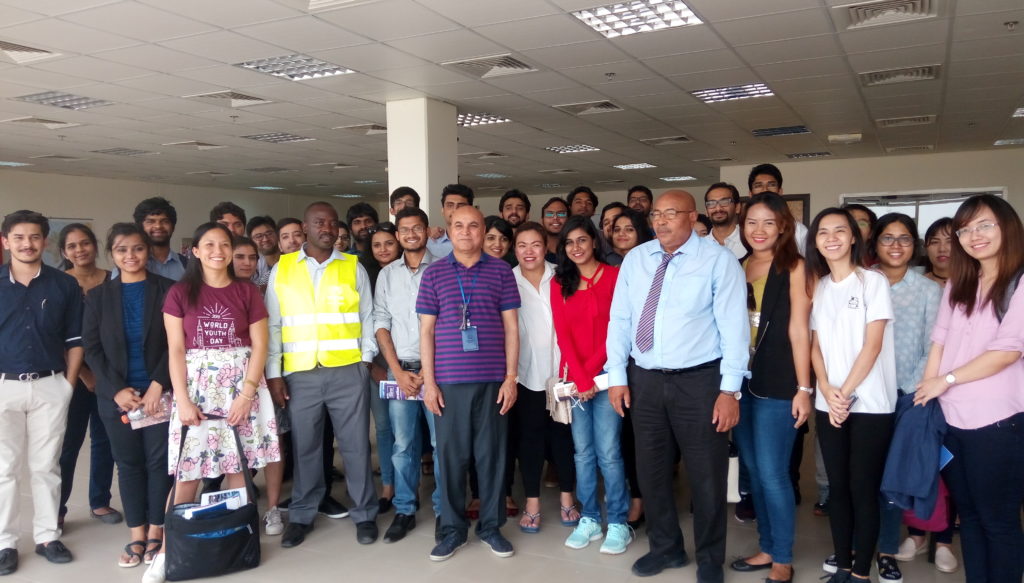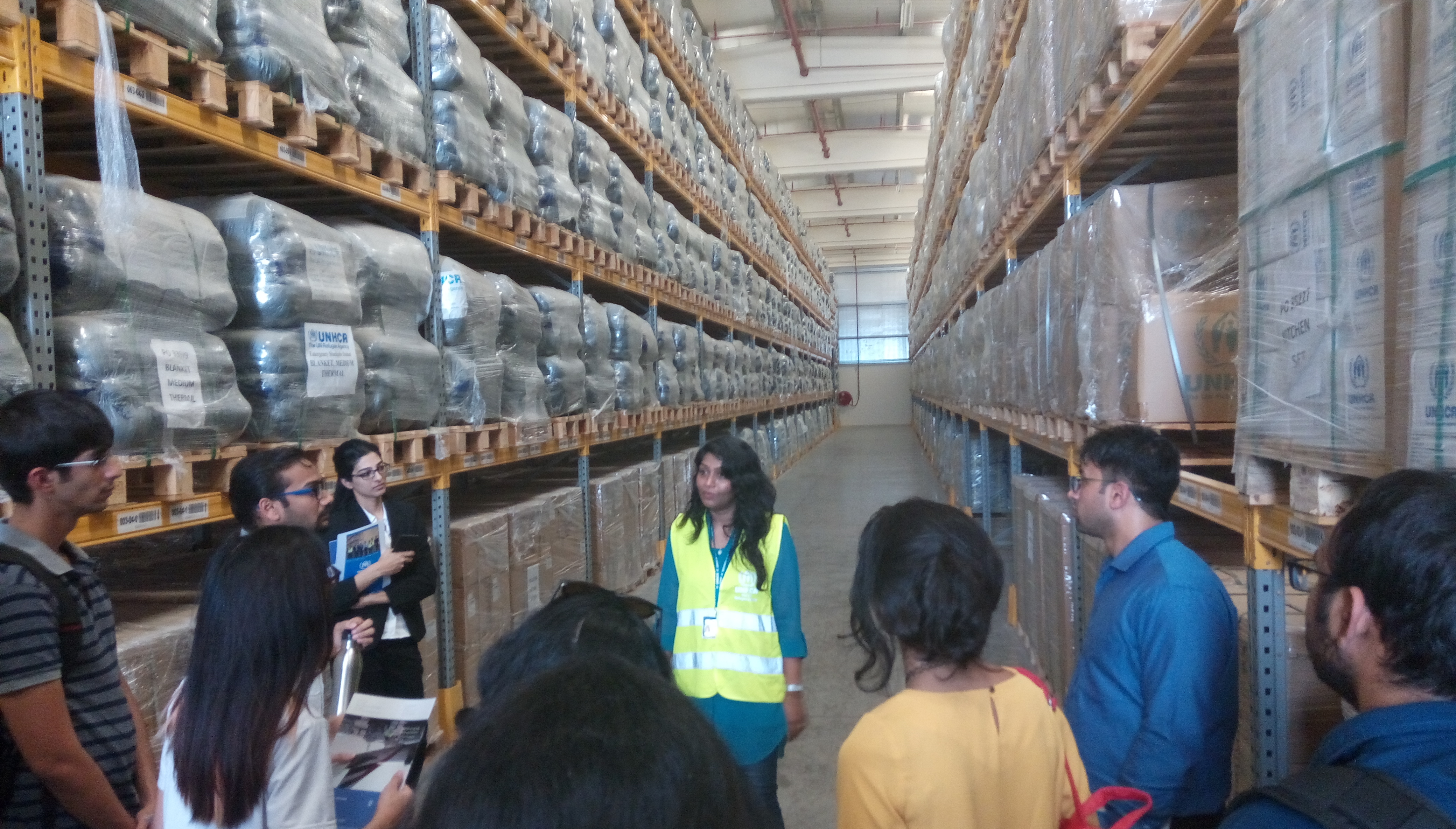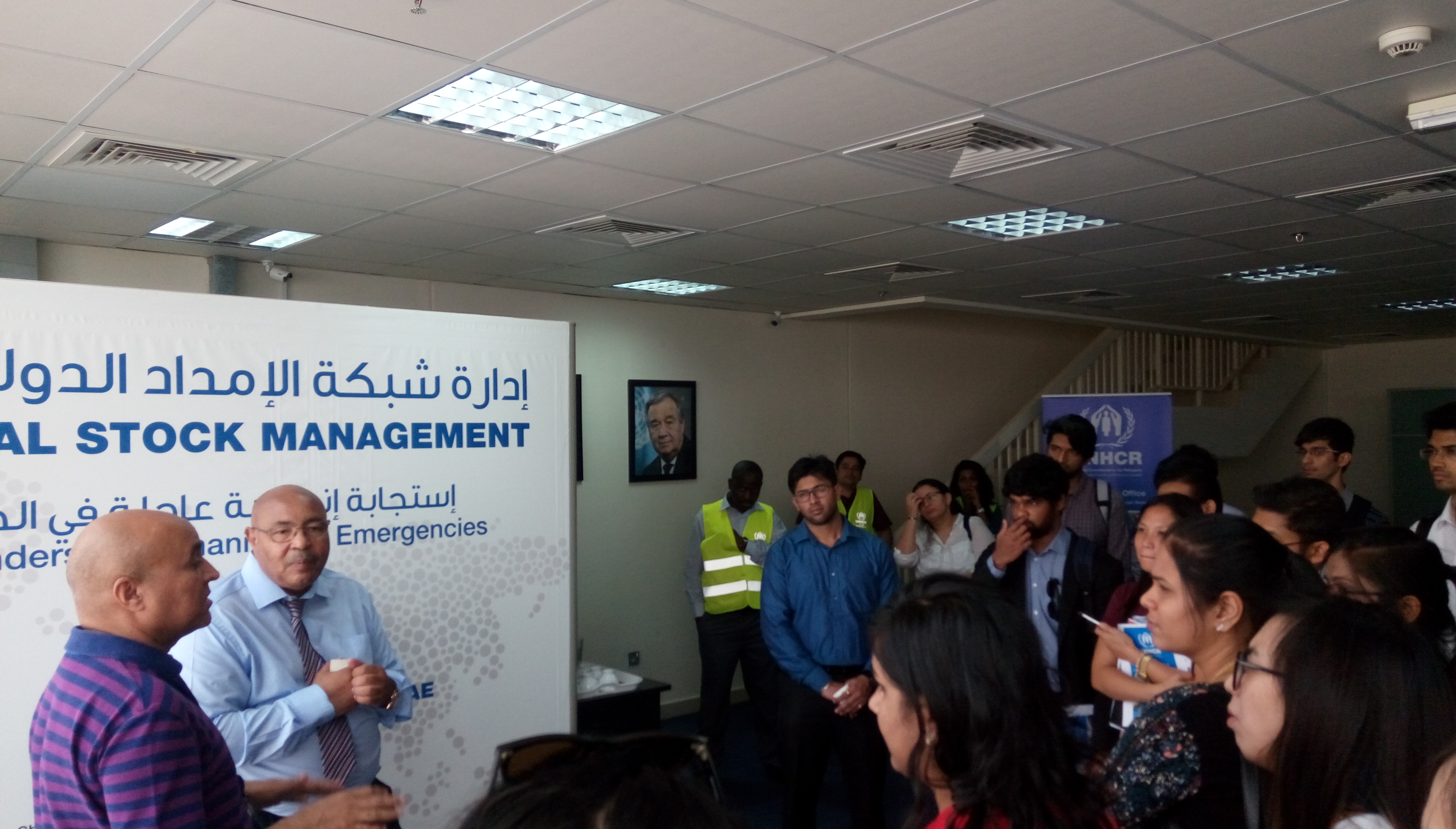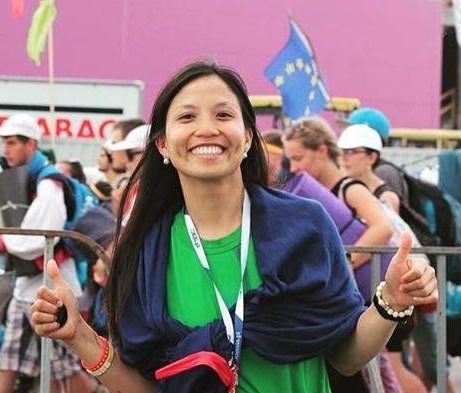Understanding Emergency Operation with a visit to UNHCR’s Largest Global Stockpile
Written by Shirley Paynor; Global MBA (GMBA – GLSCM) student. SP Jain School of Global Management – Class of 2018.

On July 13, 2017, a day after we took the class in Marketing Management and Financial Analysis where we analysed the corporation stock price and financial statement, the students immersed into a relevant kind of management and stockpile at Dubai International Humanitarian City, UAE.
SP Jain’s Master of Global Business and Global MBA students had a Global Learning dialogue with UNHCR, United Nations High Commissioner for Refugees’ Dubai Main Office, about the story of 65.5 million refugees. UNHCR, the UN Refugee Agency, is a global organisation dedicated to saving lives, protecting rights, and building a better future for refugees, forcibly displaced communities, and stateless people.
“Every item in stockpile in UNHCR represents hope after war and disaster– the life-saving items such as shelter, blankets, sleeping mats and the legal protection. In one of my mission work in Poland during World Youth Day July 2016, I personally met refugees from Syria and Ukraine, the pain in their heart is too big to express in words,” shared one of the UNHCR Officers, while talking about the stockpile.
UNHCR Dubai is the largest global emergency stockpile in the logistics hub of the world and I consider myself lucky to learn the real-life lessons from the humanitarian workers of UNHCR. In an organisation whose mandate is to save lives, efficiency matters most. Lifesaving operations need much more efficiency than is expected of most other operations. UNHCR Supply Chain Office works as a first line responder in humanitarian emergencies and is strategically located in Dubai, near the site of operation and in close proximity to the Middle East’s biggest seaport, which allows efficient and seamless coordination between manufacturers/suppliers, logistic staff, and field staff.
to learn the real-life lessons from the humanitarian workers of UNHCR. In an organisation whose mandate is to save lives, efficiency matters most. Lifesaving operations need much more efficiency than is expected of most other operations. UNHCR Supply Chain Office works as a first line responder in humanitarian emergencies and is strategically located in Dubai, near the site of operation and in close proximity to the Middle East’s biggest seaport, which allows efficient and seamless coordination between manufacturers/suppliers, logistic staff, and field staff.
As we went around the emergency stockpile, we saw the use of innovative processes in place, right from the warehouse to the field. There is quality control in the warehouse, strong connectivity even to the remotest area, and an advanced registration system. UNHCR’s Dubai Office maintains strong relations with the UAE government and several private corporations.
SP Jain students were given an overview by the Senior Global Supply Officer, Mr. Soliman Daud and Senior Supply Officer, Mr. Mohammed Yaqoob as to how the emergency operations work from warehouse, procurement, and supply chain. There is a breakdown of responsibilities: after UNHCR provides the emergency shelter, they coordinate and collaborate with other UN offices like World Food Program (for food), World Health Organization (for medicine), and UNICEF Care (for children). UNHCR provides emergency shelter, and in coordination with other UN offices and local governments, provides sustainability to the refugees.
According to UNHCR Global Supply Officer, Mr. Daud, the total number of Syrian refugees displaced in Lebanon is more than a quarter of their population! Several other refugees are in Turkey, Jordan, and other developing countries. These refugees face several issues and are even prone to human smuggling. UNHCR provides legal protection and organises integration programs such as livelihood training to the refugees, income generating jobs – agriculture, craft making and other income generating jobs.
The major challenges UNHCR faces are those of funding and security in the actual field of operation (war or disaster). According to Public Information and Communicate Associate, Ms. Ola Anan, there are 65.5 million displaced refugees that need assistance. Visiting UNHCR Dubai’s Supply Chain Office opened my eyes to the big responsibilities involved in delivering humanitarian aid. Every business organisation needs to follow a system and develop innovative technology, and the same applies to humanitarian organisations like UNHCR.

From a business operation point, we got several valuable learnings from UNHCR including how to efficiently deliver and collaborate with various organisations in the most difficult situations, as well as managing crisis. These were big lessons to learn as a global business student. One of most challenging logistic work that truly needs efficiency is “Humanitarian Logistic”, which deals with helping the refugees integrate to a new country, restore their home and dignity, and be a part of supply chain sustainability.
Despite the top-notch efforts by UNHCR, there continue to be numerous challenges which need addressing. SP Jain students volunteered to actively collaborate with UNHCR in response to the humanitarian crisis.
In 2006, UNHCR established the organisation’s largest emergency stockpile in the logistic hub of the world, the city of Dubai. The stockpile was set up as part of International Humanitarian City, which founded in 2003, courtesy of His Highness Sheikh Mohammed bin Rashid Al Maktoum, Vice President and Prime Minister of the UAE and Ruler of Dubai.
UNHCR keeps stocks ready for a time of emergency. There are 700,000 pieces available in the warehouse and in the sea. UNHCR Dubai, alone, keeps 200,000 to 300,000 of them. In order to respond instantly in the aftermath of war, 150,000 items are kept ready in the sea shipping area. There is a huge supply chain network of procurement in place to maintain the emergency stock pile.
With ardent support for UNHCR’s humanitarian work, the batch of May 2017 have formed a CSR Club at SP Jain’s Dubai campus wherein the aim would be to make a difference to the society in the place they are residing. The Club has a series of projects giving activities in line with the Center of Excellence that emphasises on the power of giving, gratitude, and more. On July 15, 2017, an initiative of “Letters of Love” will officially launch to promote awareness and to spread love to the displaced people and children of Syria and other war-torn and developing countries.
About the Author:
Shirley Paynor (GMBA ’18), is a Global Project Auditor and Global Finance Officer, who handles International Development Projects in 20 countries across continents in Asia, Europe, Latin America and Oceania. She is of the strong belief that our profession is our mission, balancing the technical work with creativity. Shirley is also a trailblazer, travelling the world for a good cause and blazing the trail of global learning and innovation. She loves numbers and nature and has immersed herself in nature, conquering the highest mountains and exploring pristine beaches – she recently completed a mountain flight at Mount Everest. Shirley captures beauty of life’s journey through writing and photography. In support of the humanitarian work and response to the humanitarian crisis, Shirley is also dedicating her GMBA Industry Project to “Humanitarian Logistics and Supply Chain Sustainability”.




